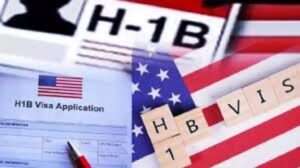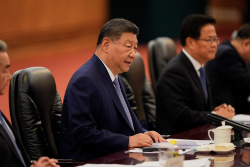
The president recently issued an executive "proclamation" imposing a $100,000 fee on applications for H-1B visas. This would effectively end most such visas, which are used by tech firms and research institutions to hire immigrant workers and researchers with a variety of specialized skills. My Cato Institute colleague David Bier, a leading immigration policy expert, has a helpful summary of the policy and the harm it is likely to cause, if not struck down by courts:
President Trump is imposing a $100,000 fee to obtain an H-1B visa—the primary visa for skilled foreign workers. To be clear, this $100,000 fee is in addition to the salary, lawyer fees, and other costs of hiring an H-1B worker. This fee would effectively end the H-1B visa category by making it prohibitive for most businesses to hire H-1B workers. This would force leading technology companies out of the United States, reduce demand for US workers, reduce innovation, have severe second-order economic effects, and lower the supply of goods and services in everything from IT and education to manufacturing and medicine.
H-1B visa holders are extremely valuable contributors to research and innovation, and some have gone on to be world-leading scientists and industry leaders, making truly massive advances.
Defenders of the visa fee argue that, if these workers are so great, then it will be worth it for employers to pay the $100,000 fee. But a fee that high likely exceeds the average expected profit from one worker during the time he or she is going to work for the sponsoring employer. There are individuals who produce much more than that, but such extraordinary success is hard to predict in advance. As I have argued previously, this is one of many reasons to avoid immigration restrictions and other government restrictions on labor mobility. In any large group of new workers, there are likely to be a few extraordinary innovators and entrepreneurs, but government planners cannot identify them in advance, and should not try. "Ordinary" workers are still useful, and the extraordinary minority who go far beyond the ordinary will become evident once given a chance. Keeping them out harms migrants and natives, alike.
H-1B workers, it is argued, drive down wages for natives who compete with them. But, by that reasoning, any new entrants into the work force are bad for existing workers. The truth is that benefits to the overall economy and society far outweigh any detriment to direct competitors. We readily see this when it comes to new native workers entering the work force, and the same logic applies here. We should reject the zero-sum game "lump of labor" fallacy that assumes there is a fixed pot of labor opportunities. A dynamic economy helps new and old workers prosper together, bolstered by growth and innovation. This is why deportations destroy more jobs for US citizens than they create, and the same is likely to be true for keeping out H-1B visa holders.
As David Bier notes, the new $100,000 fee is likely illegal, because the statutes authorizing H-1B fees only allow for fees to recoup administrative costs and some other types expenses. They certainly don't authorize anything remotely resembling a $100,000 fee.
Trump is trying to get around these constraints by relying on 8 U.S.C. Section 1182(f), gives the president the authority to "bar the entry of any aliens or of any class of aliens into the United States" whose admission he finds "would be detrimental to the interests of the United States." This is the same provision used to impose the anti-Muslim "travel ban" upheld by the Supreme Court in its badly flawed ruling in Trump v. Hawaii (2018).
But it is far from clear that Section 1182(f) and Trump v. Hawaii give the president a blank check to exclude any potential immigrants for any reasons he wants, or to impose any fees he wants. In 2020, as David Bier also notes, Trump tried to impose a similar ban on new H-1B visas, but a federal district court ruled against the ban. As the court pointed out, " there must be some measure of constraint on Presidential authority in the domestic
sphere in order not to render the executive an entirely monarchical power in the immigration context, an area within clear legislative prerogative."
The Supreme Court has repeatedly indicated that immigration is an area of legislative power. If so, there must be at least some constraint on how far it can be delegated to the executive.
In an article published in June, I advocated a nondelegation challenge to Trump's sweeping new travel ban barring all or most immigration from numerous nations. If Section 1182(f) really does give the president unlimited authority to impose massive fees on visa applications, overriding all other statutes, the same reasoning applies here.
in the same article, I also responded to arguments that the executive branch has inherent authority to impose immigration restrictions:
Prominent Founding Fathers such as James Madison and Thomas Jefferson rejected the notion that the federal government possessed any general power to restrict immigration. The Supreme Court only held otherwise in the Chinese Exclusion Case in 1889…. But if this governmental power does indeed exist – as longstanding Supreme Court precedent holds – the most plausible place for it is Congress. In the 1889Chinese Exclusion Case – that upheld the deeply racist Chinese Exclusion Act of 1882 – the Supreme Court stated that the authority belongs to "the legislative department…"
[A] few academics have argued that immigration power is actually an inherent executive power. Supreme Court Justice Clarence Thomas has suggested the same in a solo opinion joined by any other justice…. But this executive power theory makes little sense. If the president possesses inherent, virtually unlimited power to exclude non-citizens, there would be no need for the many congressional statutes that grant him some degree of authority to do so, going all the way back to the Alien Enemies Act of 1798, a wartime authority that Trump has been (illegally) trying to use to facilitate peacetime deportations without due process.
Under the inherent executive power theory, all such laws would become superfluous. The president could just exclude any immigrants he wants without any need for legislative authority. Indeed, there would be no need for Section 1182(f), either….
Since 1889, the Supreme Court has indicated that immigration restriction is a legislative power on several other occasions. For example, in Fiallo v. Bell (1977), the Court noted it "has repeatedly emphasized that over no conceivable subject is the legislative power of Congress more complete than it is over the admission of aliens." Such "complete" legislative power is incompatible with giving the executive a blank check to impose fees and restrictions.
The post Trump's Harmful and Illegal Plan to Gut H-1B Visas by Imposing $100,000 Fees appeared first on Reason.com.













 Bengali (Bangladesh) ·
Bengali (Bangladesh) ·  English (United States) ·
English (United States) ·